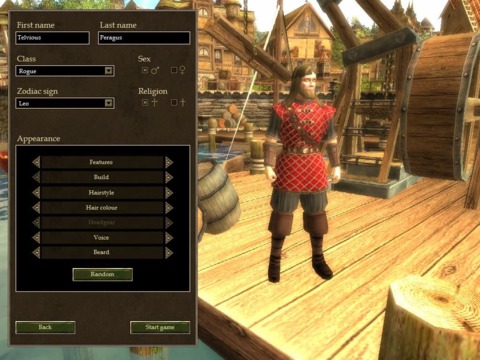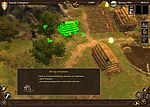The Guild 2 is a medieval role-playing game and economic simulation from the creators of Europa 1400: The Guild. The player starts out as a lone man or woman in a European city, and is free to take a number of paths on the way toward building an empire and a family dynasty.
Character Creation
When starting up a new game, the player creates a new character from scratch, customizing name, gender, class, zodiac sign, religion, appearance, and voice.
 Character Creation
Character Creation
Although most of these options are cosmetic, zodiac sign and religion have some minor effects in game (generally small stat bonuses), and the character's class determines which professions are available. There are four character classes in the Guild 2:
- Craftsmen can create products for use by the town citizens. They can collect raw materials (e.g. ore, wood, or animal hides), and combine and process those materials into usable products (e.g. metalcrafts, woodcrafts, or clothing).
- Patrons are responsible for providing food and drink to the citizens. They can operate farms to harvest plants or animal products, use those materials to produce consummables (e.g. meats, baked goods, and beer), and can serve those items to people at an inn or public house.
- Scholars are more concerned with knowledge, and can produce a number of specialized items (e.g. gold through alchemy, poison, and poetry), and can operate churches and give sermons to the citizens.
- Rogues are the criminal element in the Guild 2, and operate differently from the other classes. Instead of gathering or processing materials, or providing services for the citizens, rogues make money by stealing, either by scouting and burglarizing buildings as a thief, or waylaying shipments as a robber. Rogues can also pickpocket citizens, and tend to be combat-focused characters.
Gameplay
The main interface for the Guild 2 is a dynamic 3-D city, in which the player has free camera control. Many of the actions in the game can be initiated by selecting the player's character within the game world and selecting actions from menus. There are also a number of menu shortcuts that allow the player to avoid hunting around the map for characters and locations.
Through the course of the game, the player can take control of up to three characters at a time (all within the same family as the original character). All non-player characters live their own virtual lives and are constantly walking around the city and conducting their own business. Player characters can be ordered to walk around the map and interact with NPCs. The city map goes through a complete day-night cycle, but each "day" in the game comprises 4 years.
Running a business
Once the player has acquired a building corresponding to the business he would like to run, the operations of the business are handled primarily through menu commands. For most businesses, players must hire employees, acquire raw materials (either by collecting them or buying them from the marketplace), assign employees to produce goods or collect materials, and sell materials or goods (either through the shop's own sales stock or by transporting the goods to a marketplace). All business operations can be automated and given over to the AI if desired.
Founding a dynasty
While establishing a business empire, it is also important for the player to start a family, as the game ends once there are no more characters in the "player group", and characters can only be added to that group if they are in your family. Any adult character can court an NPC of the opposite gender. Once courting is initiated, the potential mate can be won over by giving gifts, conversation, compliments, hugs and kisses, and once the NPC has fallen in love with the character, they can marry, and the player can then control the new spouse. Married couples can "spend the night" in their house in an attempt to produce a child. Once born, children mainly walk around the house until they turn 16, although they can be sent away to school and to apprenticeship (for a fee) during this time. Once the child reaches adulthood, he or she can be added to the player group and directly controlled.
Buildings
 Placing a New Building
Placing a New BuildingAll characters in the Guild 2 start with a basic hut (residence), and a certain amount of money with which to start his or her empire. For every profession (except low-level rogues), the player will need a building from which to conduct business. Often, some buildings on the map will be for sale (indicated by floating gold pieces above the building on the map), or the player can construct a building from scratch, which is often cheaper.
There are six primary kinds of buildings in the Guild 2:
- Residences are where characters live, and provide some tools for characters to improve their standing or spy on other citizens. Improvements are available for a fee (e.g. to storage space, espionage, and burglary/fire protection), depending on the building's level. In turn, a residence can be upgraded to a higher level depending on the character's title.
- Mines, Farms, and Woodcutter's Huts collect raw materials for sale to the marketplace or individual businesses. Some improvements can be made to these buildings, but their building levels cannot be upgraded.
- Crafting buildings are where raw materials are combined into finished goods, or into intermediate goods which are then used in the production of other goods. Players can upgrade the building level and make improvements to storage space, productivity, and the kinds of goods that can be produced.
- Public businesses provide services to citizens, while often also allowing for the production of goods. These structures are upgradeable in exactly the same way the crafting buildings are.
 A Marketplace (a city hall is also visible in the lower left)
A Marketplace (a city hall is also visible in the lower left)- The Marketplace is at the center of each city, and is where raw materials and finished goods are traded. The player has no direct control over the marketplace.
- City Hall is the political center of each city. Like the marketplace, this building is completely under the control of the computer and cannot be owned or affected by the player. Within a City Hall, a character may apply for a new title, apply for public office, and accuse someone of a crime. Elections and trials also take place within city hall.
- Additionally, the game includes some miscellaneous non-player controlled buildings, such as prisons and watch towers.
System Requirements (PC)
Minimum
- OS : Windows XP / Vista / 7 / 8 / 10
- Processor : 1.8 GHz processor
- Memory : 512 MB RAM
- Graphics : 3D graphics card compatible with DirectX 9.0c
- Hard Drive : 1.4 GB available space
Log in to comment